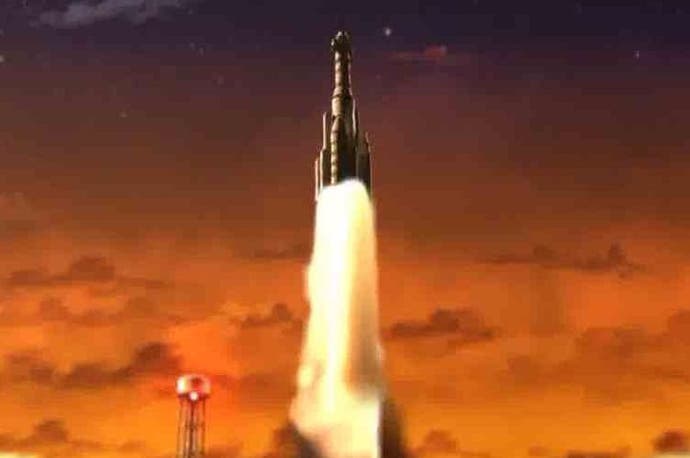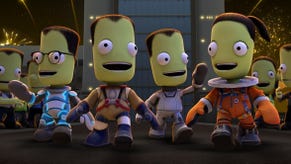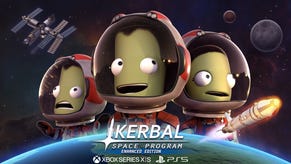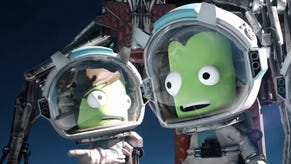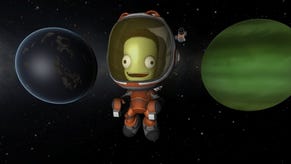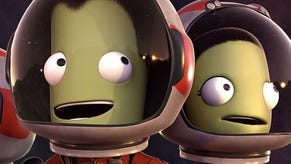Kerbal Space Program review
Between a rocket and a hard place.
Eventually, Kerbal Space Program becomes a game about triumph. Getting into space. Landing on the moon. Mastering physics to leave the ground behind and blasting into the history books on a rocket of your own creation. When it finally happens, it's one of the most satisfying moments in the history of gaming. What makes Kerbal a classic, though, is what happens before that point. As a great Kerbal once probably said, we do not choose to go to the Mun because it is easy, but because... well, why not? Look at it, hanging up there in the sky like a great big smug thing. Don't you just want to wipe the smile off its poxy moon face?
Achieving this, just one of many goals, is literally rocket science. Take a command module, slap on an engine, some fuel, perhaps a parachute if you're feeling generous, and if you're lucky, the whole thing won't explode on the launchpad or go spinning into an explosive death-dive. The cute characters and playful nature both take the edge off failure and make things more approachable than more serious attempts like Microsoft Space Simulator or the much older Buzz Aldrin's Race Into Space. They're simply a soft felt glove over an iron core, though. Kerbal Space Program both understands, and more importantly, respects the challenge of getting into space, and the tremendous war on physics that it takes. The slightest weight imbalance, the tiniest piloting mistake and: boom. Weather reports everywhere reporting roasted Kerbal raining from the skies. Again.
It takes many, many such failures before you finally get to see the world dropping away to be replaced by infinite space, in a moment as satisfying as any achievement in gaming right now - and even then it comes with a reminder that you've no more mastered the stars than a kid with a dinghy can hope to conquer the sea. It's rare for a game to truly convey that sense of wonder or the promise of something new, but this one delivers - a feeling that only happens because it's made you work your bottom off for every last little scrap of your success.

Despite this, Kerbal never feels either harsh or unforgiving. It's not the usual kind of game difficulty, where it's you versus the designers' cruel imaginations, but more of a collaborative process - the two of you silently united against the universe. It provides the tools, you provide the talent, and with those, you can conquer anything. Failure is simply plans meeting reality, with the underlying physics no more interested in screwing up your successes than knocking over what you've built. I can't speak for the raw accuracy of those simulations of course, but it feels satisfyingly realistic within its sphere, without getting so deep into the detail that it either kills the fun or demands a supercomputer. In any event, it's good enough for NASA...
The nature of the challenge means that yes, you spend much of your time building 'proper' rockets rather than anything too crazy, though it quickly turns out that even that is seriously tough. It's an easy process at least, with isolated components simply snapping together in a basic hangar interface, with your first rocket ready to go in just a couple of minutes. Once beyond a simple engine on a command pod though, the complexity immediately spikes. Rockets have to be properly balanced, their fuel placed where it won't blow up, their fins and things positioned for aerodynamic effect rather than just style. Different stages of flight have their own complexities, as do minor trivialities like both getting Kerbals to the moon and being able to get them back home again. Not for nothing is there a tutorial that covers, with the game's typical tongue-in-cheek style, "Essential manoeuvres like raising and lowering apoapsis and periapsis nodes, and also important concepts, such as what 'apoapsis' and 'periapsis' mean." You don't have to know, but you will eventually have to learn.
Somehow though it never feels like - shudder - edutainment, or at least, no more so than the goofy fun of repeatedly smashing the moon into the Earth back in Encarta's old Orbit mini-game. It's always a game first, with the light-heartedness not simply allowing, but openly encouraging insane experiments and ridiculous ships with enough engines to risk moving the planet during blast-off. In another game, your would-be astronauts would likely come with a whole raft of skills, like piloting and engineering. Here, they have just two: Courage and Stupidity. It's all they need, with no amount of failure diminishing their cheery joy.
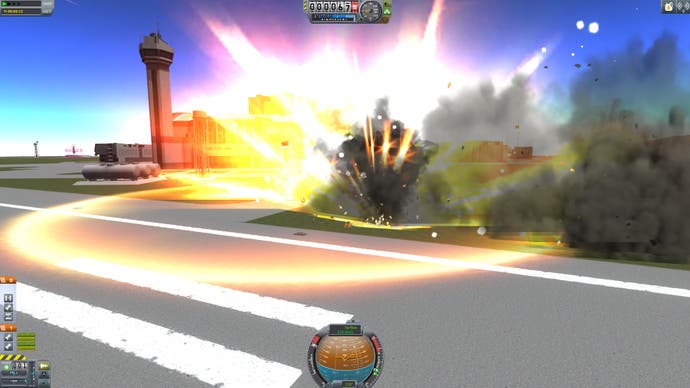
Meanwhile, you get to do all of the fun stuff, from deciding what your objective is, to doing the designs, to taking control of each ship and piloting your creation to the stars. Kerbal doesn't waste time worrying about history or finger-wagging at failure, or refusing to let you build something just because even a four-year-old can see it's certifiably insane. You're in charge, able to do anything you like with the pieces at your disposal. In a way, it's almost a shame that there are tutorials, reinforcing that there is a right way to go about things and offering a sneak preview of what it's going to be like when you reach space and walk on the Mun. They're needed though, as you move from intuitive 'fire make rocket go up' logic to more complex issues of orbiting and docking. There's still nothing like the feeling when you first manage any of it on your own, born of the satisfaction of having both built your ship and personally piloted it safely across the threshold of disaster.
Fortunately, the main game isn't so cruel as to just give you a hangar, a million parts, and a pat on the back. If you want it to, of course, it will. That's Sandbox mode. On the other end of the spectrum entirely, there's Career mode, which adds an economics and research element to things. Here you get missions to undertake, have to pay for things and uphold a reputation, and otherwise deal with terrestrial concerns as much as space ones. It's a solid attempt to make this more of a game than a toy, but it's honestly not very interesting.
Between the two is arguably the ideal middle-ground, Science Mode. Here, you begin with just the basic rocket parts to construct the simplest ship, performing scientific accomplishments to unlock the tech tree and get your hands on better toys, while still being in charge of your own destiny. This makes it far, far easier to learn the ropes, while still simulating a sort of ideal-world NASA - one that can devote itself entirely to the job, and ever more ambitious goals. Shooting for the Mun is just the start. There are six other planets spinning around Kerbal's sun, to say nothing of any personal ideas you bring to the table. YouTube already drips with crazy inventions, and beyond that, the flourishing mod scene is bolting on even more possibilities.
That scope is what makes Kerbal so special, and for so long. It's a sandbox experience that starts out feeling somewhat restricted - build a rocket, how hard can that be? With every fresh realisation that the answer is "Surprisingly!" comes ever-greater personal challenge - to do it in style, to go one planet further, to slip the surly bonds of Kerbal and break those pesky laws of physics over your knee. There's no better way to both appreciate the real-world achievement that made it possible for us to go to the Moon in the 60s, and to enjoy the vicarious delight as your army of adorable little astronauts finally make it to the Mun, and beyond.
Kerbal Space Program will be offered as a Gamer's Edition. Gamer's Edition is a business operated by Gamer Network, which also owns Eurogamer.net. All coverage of Gamer's Edition and related games is at the editors' discretion. Read our editorial policy for more information.
